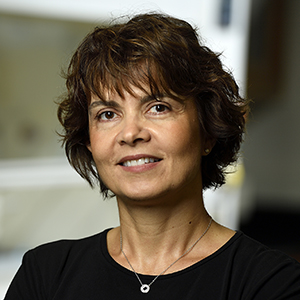Self-assembly of amphiphilic molecules is an attractive method to engineer supramolecular materials for biomedical and other applications. In my group, we focus on the design of DNA-amphiphiles and evaluate how different building blocks of the amphiphiles affect their tendency to self-assemble spontaneously into different nanostructures. In this presentation, I will discuss aspects of the molecular design of DNA-amphiphiles that control the formation of functional nanostructures, along with the use of these amphiphiles as biosensors, artificial metalloenzymes and targeted delivery nanoparticles.

Efie Kokkoli, a targeted drug delivery specialist, is a professor in the Chemical and Biomolecular Department at the John’s Hopkins Whiting School of Engineering.
Her research focuses on the areas of DNA nanotechnology, multi-targeted gene and drug delivery, and the design of biopolymers and responsive hydrogels. With the goal of directing nanoparticles capable of carrying cancer drugs to tumor sites while sparing non-cancerous areas, her group concentrates on designing biomaterials ranging from polymeric nanoparticles to DNA nanotubes that respond best under certain conditions, like temperature or pH, and have specificity for cancer cells.